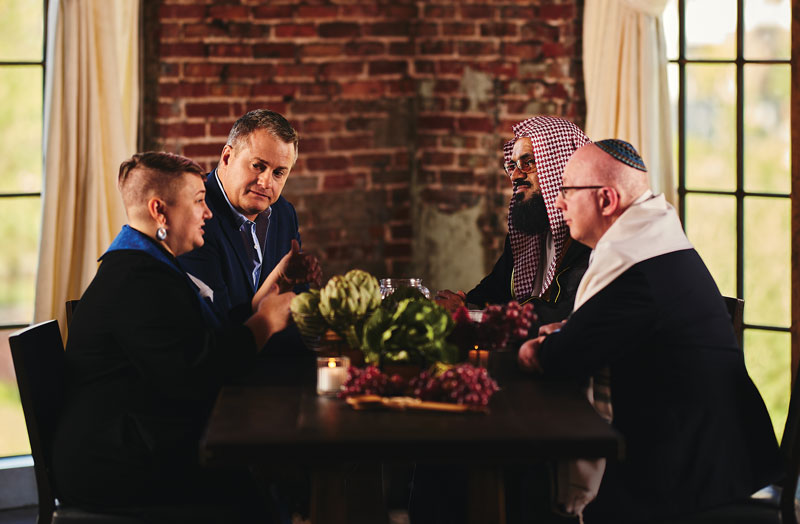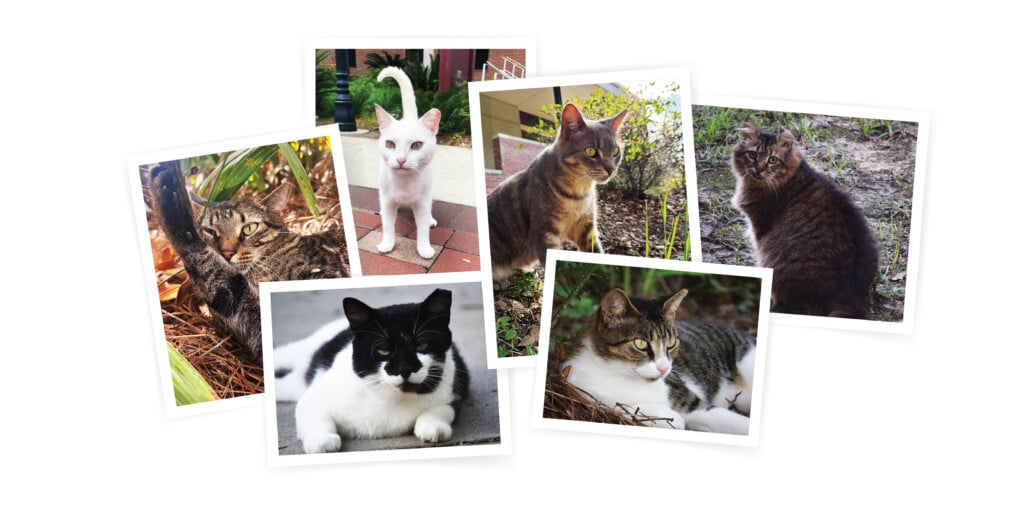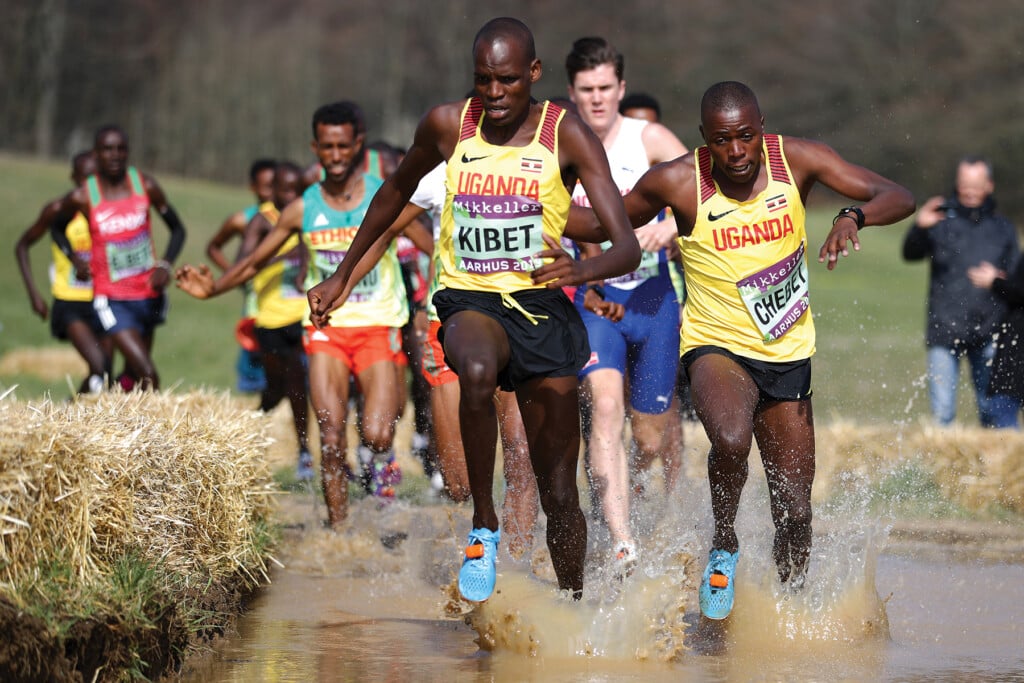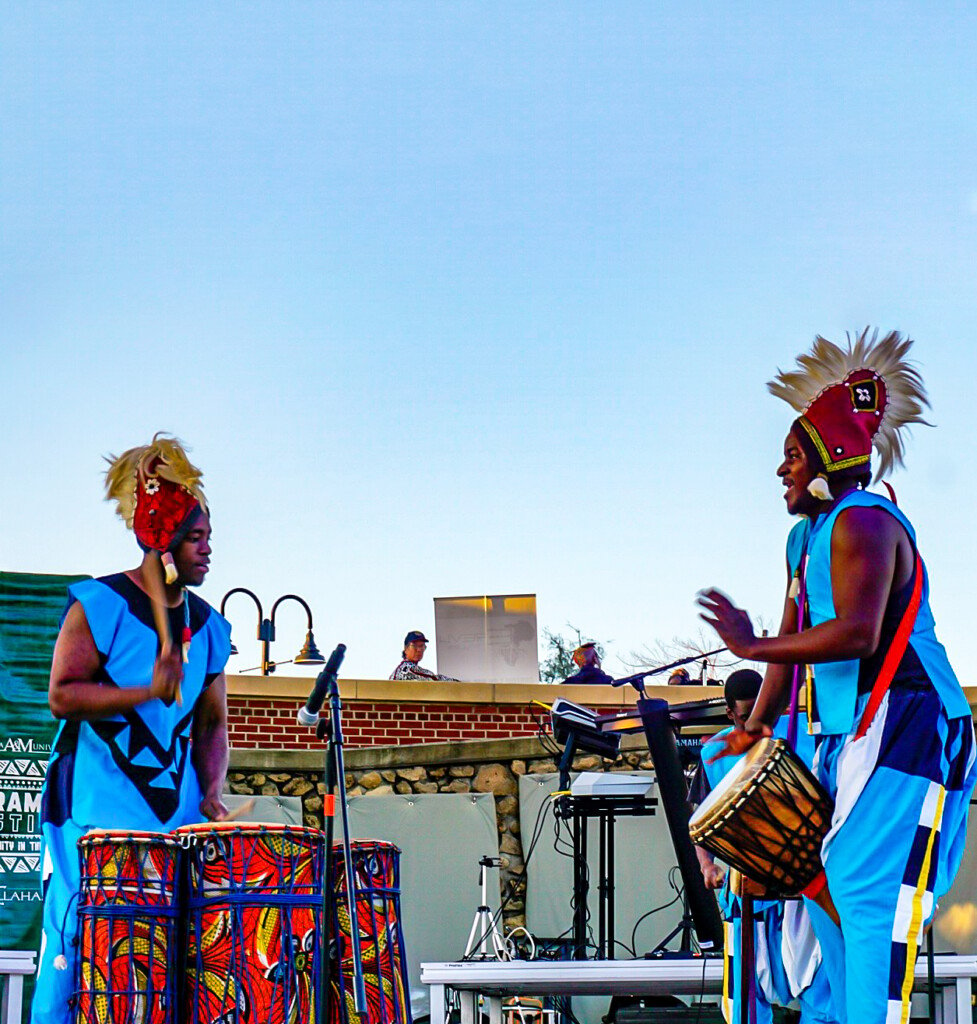Prospects for Peace
Most everyone wants it. How do we bring it about?

It’s the holiday season. Seasonal music is playing in stores, and familiar movies have overtaken television channels. But many people, including a knot of folks loosely gathered outside a restaurant, are finding it hard to get in celebratory moods. Concerns about global warming, gun violence, refugees and war occupy their minds, and the problems seem intractable. How, they wonder, might they find peace? Is it even possible to have peace on earth?
The growing crowd takes notice as a priest, a rabbi, an imam and two pastors, joined by a Hari Krishna believer and a Florida State University professor of philosophy enter the restaurant. To the onlookers, the group appears weighty, important.
Reverend R.B. Holmes of Bethel Missionary Baptist Church takes a seat at the head of a table and presently comments on menu offerings to Imam Monir of the Islamic Center and Rabbi Paul Sidlofsky from Temple Israel. Father Michael Foley from Good Shepherd Catholic Church pulls up a chair beside Hari Krishna devotee Kaliya Damana Das and Simon May, Ph.D., from FSU. The Rev. Becky Rokitowski from St. Paul’s United Methodist Church settles in beside the Rev. Holmes.
All offer thoughts about peace and how on earth to get there.
Conferring, Father Foley and the Rev. Holmes pull no punches as they inventory the world’s crises.
“We live in a broken and divided nation,” Holmes says. “There are more guns than people. North Korea, China, Russia and Ukraine are a threat to our own peace.”
“Even within the church there are divisions,” Foley adds. “So few people want to surrender anything for the greater good.”
Imam Monir expands on what that greater good might be. “In Islam, God tells us to deal justly with others. To find peace is to spread such justice. But order yourself first. We are all on this ark together. And like the animals, though we are different — the beauty of life is that very difference.”

Imam Monir of the Islamic Center. Photo by The Workmans
Rabbi Sidlofsky nods, saying we must react less and listen more. “Of course, one should be suspicious of those who insist they know the truth because there are different ‘truths.’
We need to recognize that we do not have a monopoly on the truth. Hearing from others in a nonjudgmental way, noting our similarities and accepting those differences among us is a dialogue that can lead to better understanding.”
The onlookers have pressed their faces to the window and are listening intently.
Another vision from the faith leaders around the table comes from Kaliya Damana Das, who runs the Iskcon Center, a retreat and meditation center on 30 acres near Monticello.
“People want peace,” he says, “but their perception is that it is all about the body, all about the mind. Instead, we are spirit souls — a part of the Divine Mother and Father. Identifying ourselves as only physical or mental creatures is like presenting a fake I.D. to the world, with labels — black, white, gay, straight, Russian, Ukrainian — that can get in the way. We cannot find true peace without dropping this body concept that separates us.”

Rev. Becky Rokitowski from St. Paul’s United Methodist Church. Photo by The Workmans
The Rev. Rokitowski smiles. “Our Christian faith tells us that God will set all things right one day. But even now, we can see an in-breaking of that peace when we extend grace and love to one another. We can get glimpses as if real peace is both here already and not yet, all at the same time. But choosing peace is hard.”
Prof. May, who works in the area of moral and political philosophy, offers comments from a different perspective. “Immanuel Kant wrote in 1795 that peace is achieved not through just an absence of conflict, but through an acceptance of norms common to states, ones that don’t just reflect the dominant power’s cultural system.”

Simon May, Ph.D. Photo by The Workmans
Really? It’s that easy? Just agree to some commonalities and subordinate conflict to a few impartial rules, and Kant says it will all work out peacefully? Most at the table sigh and shake their heads.
“What is important is that conflicts can be resolved through the application of impartial rules rather than a recourse to violence.” says Simon May, Ph.D.
“Peace is a process,” Sidlofsky says. “Before we expect to see peace in the community and the world, we must begin by examining our own hearts, trying to realize that we will all make mistakes, and therefore we must prepare to offer forgiveness and understanding.”
Sidlofsky sits back from the table. “When I was in rabbinical school in London, I attended a conference with Christian, Muslim and Jewish students, some of whom had been impacted by the Holocaust. We each told our stories. And while the translators brought the stories to life in our own languages, we paused, thinking before responding, which enabled us to process the experiences of participants so different from ourselves. And that is when understanding began.”
Holmes then asks a question and quickly supplies an answer.
“What is peace? It is the inner grace and grittiness to never quit. An authentic peace empowers us to remain faithful to our purpose or calling. Peace is a gift from God.”

Reverend R.B. Holmes of Bethel Missionary Baptist Church. Photo by Dave Barfield
He continues:
“What is peace? It is when one does not allow the cares of this world, the preoccupation with power, possession, position, popularity and profit to become one’s God. I firmly believe that peace comes when we strive to act justly, walk with God, love each other, forgive each other and rise up against the evils of racism, bigotry, homophobia and xenophobia.”
Foley has been quiet, but in his gentle Irish accent he now reflects on the times when his home country was troubled. Catholic versus Protestant strife tore asunder England and Ireland, and many died.
“Since the 1600s, one group had felt oppressed by another, prejudice was passed down and people on both sides refused to hear the other,” Foley says. “And then something happened; a few men on both sides decided to compromise for the greater good. They came to the table together with a common goal, knowing all the while each would have to surrender some belief that had kept the troubles going. And so they did. And for that, I am hopeful that peace for man is possible.”
The imam reaches to take the hand of the priest, who grasps that of the rabbi, who links fingers with the two reverends, who extend the chain of clasped hands to the philosopher and the Krishna believer.
“Yes, Father Foley,” says the imam.
“My freedom has its limits at where your freedom starts. We can live without fences but with respect.”
“What is important is that conflicts can be resolved through the application of impartial rules rather than a recourse to violence,” May says.
“I believe that dialogue holds the hope,” Sidlofsky says. “Yes, I am cautiously optimistic. We must never stop working in that direction.”
Kaliya Damana Das,
left, pictured with wife Janesvari Devi Dasi. Photo courtesy of Kaliya Damana Das“We have known it when the truth has been spoken — Jesus, Gandhi, Martin Luther King,” Kaliya Damana Das says. “The way has been pointed to peace.”
The Reverend Rokitowski nods.
“It is us. We have to be the peace among us, though that choice is hard.”
And soon, like blessings from above, snippets of wisdom float through the air of the restaurant.
“The greatest good for the greatest number,” says the philosopher Jeremy Bentham. Martin Buber whispers, “I and thou, we must engage together, have dialogue, see the ‘other’ as an individual, and never dehumanize them.”
Mahatma Gandhi’s words provide a benediction.
“Peace is not an entity nor a commodity nor even a state of affairs between governments, but it is a way of life. To be one day united in peaceful ends means you must get there by peaceful means.”
From the tablemates and the onlookers beyond arises a collective “Amen.”




